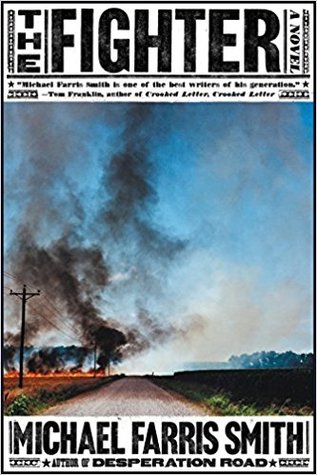The epigraph of Oxford-based author Michael Farris Smith’s most recent novel, “The Fighter,” reads a quote by John Steinbeck: “To be alive at all is to have scars.” Few quotes could more accurately describe the experience of the protagonist, ex-fighter Jack Boucher, who bears literal and figurative scars from his years spent fighting for money and reveling in the blistered landscape of the Mississippi Delta.
“The Fighter” will be released Tuesday, and Smith is set to read and sign copies at Off Square Books at 5 p.m. to kick off the 25th Oxford Conference for the Book.
Most of the novel takes place well after the successful years of Jack’s prime. Now, Jack is in his 40s and is battling debilitating headaches and more debilitating regret. Jack’s foster mother, Maryann, lies in a nursing home with advanced dementia and does not have long to live. Meanwhile, Jack, having squandered his earnings from years of fights, has taken out loans against the house signed over to him by Maryann and has borrowed large sums of money from the dangerous Big Momma Sweet. He struggles to redeem his failures by paying off his debt and preventing the bank from foreclosing on Maryann’s home.
 Unable to run and risk being away from home when Maryann dies and unable to hide from the far-reaching and murderous grasp of Sweet, Jack realizes he is “living in the immediacy of have to.”
Unable to run and risk being away from home when Maryann dies and unable to hide from the far-reaching and murderous grasp of Sweet, Jack realizes he is “living in the immediacy of have to.”
The concussive brain damage that produces Jack’s headaches engenders a powerful and interesting way of changing setting and perspective. The novel takes place at the intersection of two worlds: the harsh Mississippi Delta and “the blurred world of a rocked mind.” The narrative is shaped by the blistering and wild Delta, and the framing of a concussed mind provides a moving and insightful portrait of Jack, flitting between past and present. The story delves into Jack’s motivations and eventually shifts the perspective to that of another character just as Jack’s desperation brings him to the brink of collapse.
The novel is brutal throughout, describing in gritty detail all the heartbreak of failure and the pain of not belonging, not to mention physical violence. However, this brutality is tempered by poignancy. Smith’s elegant use of a Cormac McCarthy-esque disregard for traditional syntax and punctuation empowers him to depict stomach-turning violence and earnest, heartbreaking humanity all in the same paragraph.
Though fraught with desperation, “The Fighter” is ultimately a tale of triumph and deliverance. This deliverance comes from Annette, a young woman who believes herself to be an angel of her own “church of coincidence.”
Annette unwittingly restores Jack’s belief in himself. In Annette, Jack finds that “his own blood did remain in the world but it did not run in the veins of those who put his small feet into the dirt and drove away from the Salvation Army store so many years ago but it flowed through the veins of a young woman. A young woman led by her own conviction. A young woman who had followed him unconcerned about the risk because she believed him to be something to her …”
In “The Fighter,” Smith weaves a tale of fate and family, desperation and deliverance, secrets and the search for self. This mostly bleak narrative ultimately leaves readers with the idea that meaning and belonging come not in definitive self-discovery but in a willingness to adapt to life’s surprises.
In the flashback that ends the novel, Maryann tells a young Jack, “Life drove up to my house in a white van about seven years ago … It gave me something honest and tender and it asked me to become something else and I thought I was ready for it. But I wasn’t. And I know I’m different than I was before you came here. And that is what I mean. You will want to know who you are today and tomorrow and the next day for the rest of your life. And that is good.”
Smith’s celebration of the book’s release at Off Square Books on Tuesday will mark the start of this year’s Oxford Conference for the Book. The 25th annual event will run from Wednesday to Friday this week.






